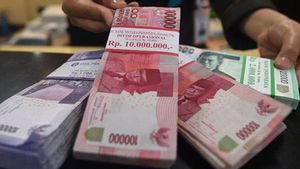JAKARTA - DBS Group Research projects that the benchmark interest rate of Bank Indonesia (BI) will be cut by 50 basis points (bps) this year, along with the projected decline in inflation for a full year, opening up opportunities for easing central bank policies.
"DBS Group Research estimates policymakers will still take advantage of the opportunities that exist, when the tariff issue settles, to lower interest rates by 50 bps this year, because the real interest rate indicates a significant buffer," said Senior Economist of Bank DBSturb Rao in a statement quoted by Antara, in Jakarta, Tuesday, April 22.
Inflation in March 2025 on an annual basis (year on year / yoy) was recorded at 1.03 percent with a Consumer Price Index (JCI) of 107.22.
DBS Group Research noted that the implementation of the "one-way" policy made March inflation increase compared to the average 0.3 percent increase in January-February.
This is also reflected in the decline in government-regulated inflation (administered prices) which is at the level of -3.2 percent on an annual basis compared to the average of -7.7 percent in the first two months of 2025.
"Transportational inflation remains limited by adjustments to the reduction in non-subsidized prices," notesTEN.
DBS Group Research noted that IHK inflation remains below Bank Indonesia's target in the range of 1.5 percent to 3.5 percent due to the impact of government policies such as discounted electricity rates, toll rates, and air transportation tickets.
Meanwhile, core inflation averaged 2.4 percent in the first quarter of 2025.
DBS Group Research also estimates that general inflation will move higher in the second half of 2025.
Although the second half is stronger, DBS Group Research revised its full year inflation decline to 1.7 percent on an annual basis from its previous estimate of 2.0 percent.
BACA JUGA:
mencapaikan, perkembangan inflasi yang cukup kondusif membuka peluang untuk pelonggaran kebijakan moneter.
On the other hand, the central bank is likely to pay more attention to financial markets, especially with the further weakening of the rupiah as global uncertainty continues.
Policymakers are likely to oversee financial markets, with further weakening of rupiah and bonds, due to global uncertainty and prolonged uncertainty over domestic fiscal developments that could drive markets to forecast lower interest rates this quarter.
The English, Chinese, Japanese, Arabic, and French versions are automatically generated by the AI. So there may still be inaccuracies in translating, please always see Indonesian as our main language. (system supported by DigitalSiber.id)















